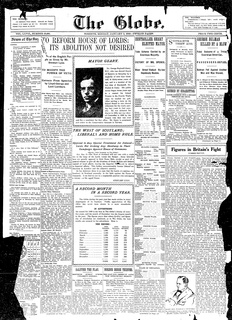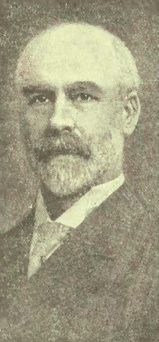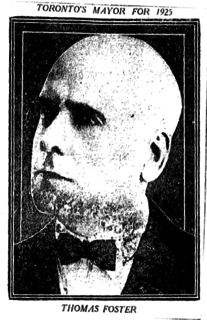Municipal elections were held in Toronto, Ontario, Canada, on December 7, 1953. Incumbent mayor Allan Lamport won an unexpectedly close race against school board trustee Arthur Young. This election was the first for councils in the municipality of Metropolitan Toronto which would be created on January 1, 1954 and was composed of 14 municipalities: the City of Toronto, the towns of New Toronto, Mimico, Weston and Leaside; the villages of Long Branch, Swansea and Forest Hill, and the townships of Etobicoke, York, North York, East York, and Scarborough.
Municipal elections were held in Toronto, Ontario, Canada, on January 1, 1943. Incumbent Frederick J. Conboy was acclaimed as mayor. There was a very low voter turnout, but the election was a victory for the left as the Co-operative Commonwealth Federation (CCF) and Communist Party each won two seats.
Municipal elections were held in Toronto, Ontario, Canada, on January 1, 1936. Sam McBride was elected mayor in a three-way race in which incumbent James Simpson finished third.
Municipal elections were held in Toronto, Ontario, Canada, on January 1, 1935. James Simpson won a surprise victory in the mayoral campaign to become the first socialist candidate elected to the office.
Municipal elections were held in Toronto, Ontario, Canada, on January 1, 1926. Thomas Foster was reelected mayor.
Municipal elections were held in Toronto, Ontario, Canada, on January 1, 1925. Thomas Foster was elected mayor ousting incumbent Wesley Hiltz. The election included a referendum where voters passed a motion in favour of building a new water plant. This eventually became the R. C. Harris Water Treatment Plant.
Municipal elections were held in Toronto, Ontario, Canada, on January 1, 1923. Charles A. Maguire was reelected to his second term as mayor.
Municipal elections were held in Toronto, Ontario, Canada, on January 2, 1922. Incumbent mayor Tommy Church did not run for reelection. Charles A. Maguire was the only candidate who ran to succeed him and he was acclaimed.
Municipal elections were held in Toronto, Ontario, Canada, on January 1, 1921. Mayor Tommy Church was elected to an unprecedented seventh consecutive term in office.
Municipal elections were held in Toronto, Ontario, Canada, on January 1, 1919. Mayor Tommy Church was elected to his fifth consecutive term in office. This election marked the creation of Ward 8, covering the recently annexed areas of East Toronto. The representation of Ward 7 was also increased to have three alderman like every other ward.
Municipal elections were held in Toronto, Ontario, Canada, on January 1, 1918. Mayor Tommy Church was elected to his fourth consecutive term in office.
Municipal elections were held in Toronto, Ontario, Canada, on January 1, 1917. Mayor Tommy Church was acclaimed to his third consecutive term in office.
Municipal elections were held in Toronto, Ontario, Canada, on January 1, 1916. Mayor Tommy Church was elected to his second term in office.
Municipal elections were held in Toronto, Ontario, Canada, on January 1, 1915. Tommy Church was elected mayor defeating Jesse O. McCarthy.
Municipal elections were held in Toronto, Ontario, Canada, on January 1, 1913. H.C. Hocken was elected to his first full term as mayor.
Municipal elections were held in Toronto, Ontario, Canada, on January 1, 1912. Mayor George Reginald Geary faced no opponents and was acclaimed for reelection.
Municipal elections were held in Toronto, Ontario, Canada, on January 2, 1911. Mayor George Reginald Geary was easily reelected mayor.

Municipal elections were held in Toronto, Ontario, Canada, on 1 January 1910. George Reginald Geary was elected to his first term as mayor. Two plebiscites were passed:
- To build a tube and surface subway transit system;
- Election of Board of Education by wards.
Municipal elections were held in Toronto, Ontario, Canada, on January 1, 1909. Joseph Oliver was easily re-elected to his second term as mayor. One of the central issues of the campaign was whether the city should construct a bridge over the Don River connecting to Danforth Avenue. A referendum was held as part of the vote, and the bridge was approved. It would be built as the Prince Edward Viaduct.





